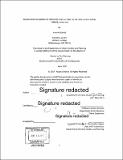Reimagining planning of irrigated agriculture in the Indus River Basin, Punjab, Pakistan
Author(s)
Shahid, Ayesha, M.C.P. Massachusetts Institute of Technology
DownloadFull printable version (8.535Mb)
Other Contributors
Massachusetts Institute of Technology. Department of Urban Studies and Planning.
Advisor
James Wescoat.
Terms of use
Metadata
Show full item recordAbstract
Faced with rapid resource degradation in the Indus river basin in Punjab, Pakistan, the provincial government of Punjab has identified 'integrated water resource management' as the guiding paradigm for achieving efficient, equitable and environmentally sustainable use of natural resources in the province. However, no clear roadmap for how multi-sectoral, 'integrated' resource management and governance can be operationalized exists. Focusing on irrigated agriculture in Punjab, this thesis uses a combination of historical, institutional and empirical analyses to investigate how 'integrated' food and water planning can be achieved in Punjab. The historical analysis traces how the idea of 'integration' in irrigated agriculture has evolved in Pakistan's colonial history and within the province of Punjab after independence. It reveals that both the departments of irrigation and agriculture have highlighted the need for vertical and horizontal integration within and between the departments throughout their existence. They have experimented with various institutional configurations and many reforms, like the creation of the On-Farm Water Management directorate and introduction of participatory irrigation management, have been implemented in an effort to achieve this integration. The institutional analysis explores how planning is done within and across the provincial departments of agriculture and irrigation. It finds that currently only the provincial tiers are responsible for planning within the two departments while the sub-provincial tiers are responsible for management and operational functions. Coordination between the departments happens by way of the provincial Planning and Development department as the final approver of their proposed plans. Finally, the empirical analysis uses annually collected departmental data to develop metrics that can enable integrated planning of irrigated agriculture. In conclusion, this thesis uses the idea of boundary spanning organizations and objects and builds on the historical, institutional and empirical analysis to propose recommendations for how planning in the Indus River Basin of Punjab can be re-imagined.
Description
Thesis: M.C.P., Massachusetts Institute of Technology, Department of Urban Studies and Planning, 2017. Cataloged from PDF version of thesis. Includes bibliographical references (pages 86-93).
Date issued
2017Department
Massachusetts Institute of Technology. Department of Urban Studies and PlanningPublisher
Massachusetts Institute of Technology
Keywords
Urban Studies and Planning.